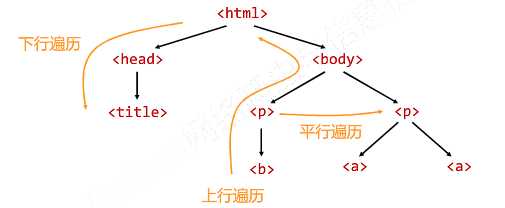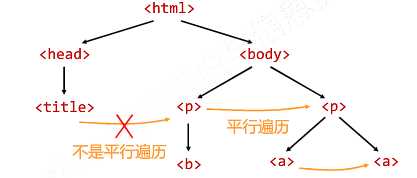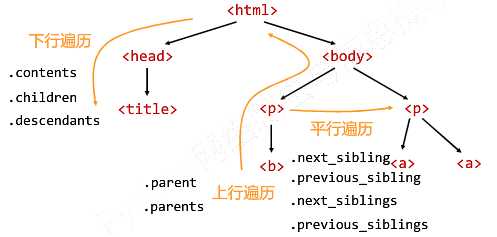Win平台:“以管理员身份运行” cmd
执行 pip install beautifulsoup4
演示HTML页面地址:http://python123.io/ws//demo.html
文件名称:demo.html

网页源代码:HTML 5.0 格式代码

BeautifulSoup库的安装小测:
>>> import requests >>> r = requests.get("http://python123.io/ws//demo.html") >>> r.text ‘<html><head><title>This is a python demo page</title></head>\r\n<body>\r\n<p class="title"><b>The demo python introduces several python courses.</b></p>\r\n<p class="course">Python is a wonderful general-purpose programming language. You can learn Python from novice to professional by tracking the following courses:\r\n<a href="http://www.icourse163.org/course/BIT-268001" class="py1" id="link1">Basic Python</a> and <a href="http://www.icourse163.org/course/BIT-1001870001" class="py2" id="link2">Advanced Python</a>.</p>\r\n</body></html>‘ >>> demo = r.text >>> from bs4 import BeautifulSoup >>> soup = BeautifulSoup(demo,‘html.parser‘) >>> print(soup.prettify()) <html> <head> <title> This is a python demo page </title> </head> <body> <p class="title"> <b> The demo python introduces several python courses. </b> </p> <p class="course"> Python is a wonderful general-purpose programming language. You can learn Python from novice to professional by tracking the following courses: <a class="py1" href="http://www.icourse163.org/course/BIT-268001" id="link1"> Basic Python </a> and <a class="py2" href="http://www.icourse163.org/course/BIT-1001870001" id="link2"> Advanced Python </a> . </p> </body> </html> >>>
Beautiful Soup库的基本元素:
? Beautiful Soup库的理解:

Beautiful Soup库是解析、遍历、维护“标签树”的功能库。
<p>..</p> : 标签Tag

Beautiful Soup库的引用:
? from bs4 import BeautifulSoup
? import bs4
Beautiful Soup库解析器:
soup = BeautifulSoup (‘<html>data</html>‘,‘html.parser‘)

BeautifulSoup类的基本元素:
< p class = "title" > ... </p>

Tag标签:
>>> from bs4 import BeautifulSoup >>> soup = BeautifulSoup(demo,‘html.parser‘) >>> soup.title <title>This is a python demo page</title> >>> tag = soup.a >>> tag <a class="py1" href="http://www.icourse163.org/course/BIT-268001" id="link1">Basic Python</a>
? 任何存在于HTML语法中的标签都可以用soup.<tag>访问获得当HTML文档中存在多个相同<tag>对应内容时,soup.<tag>返回第一个
Tag的name:
>>> from bs4 import BeautifulSoup >>> soup = BeautifulSoup(demo,‘html.parser‘) >>> soup.a.name ‘a‘ >>> soup.a.parent.name ‘p‘ >>> soup.a.parent.parent.name ‘body‘ >>>
每个<tag>都有自己的名字,通过<tag>.name获取,字符串类型
Tag的attrs(属性):
>>> tag = soup.a >>> tag.attrs {‘href‘: ‘http://www.icourse163.org/course/BIT-268001‘, ‘class‘: [‘py1‘], ‘id‘: ‘link1‘} >>> tag.attrs[‘class‘] [‘py1‘] >>> tag.attrs[‘href‘] ‘http://www.icourse163.org/course/BIT-268001‘ >>> type(tag.attrs) <class ‘dict‘> >>> type(tag) <class ‘bs4.element.Tag‘>
一个<tag>可以有0或多个属性,字典类型
Tag的NavigableString:
>>> soup.a <a class="py1" href="http://www.icourse163.org/course/BIT-268001" id="link1">Basic Python</a> >>> soup.a.string ‘Basic Python‘ >>> soup.p <p class="title"><b>The demo python introduces several python courses.</b></p> >>> soup.p.string ‘The demo python introduces several python courses.‘ >>> type(soup.p.string) <class ‘bs4.element.NavigableString‘>
NavigableString可以跨越多个层次
Tag的Comment:
>>> newsoup = BeautifulSoup("<b><!--This is a comment--></b><p>This is not a comment</p>","html.parser") >>> newsoup.b.string ‘This is a comment‘ >>> type(newsoup.b.string) <class ‘bs4.element.Comment‘> >>> newsoup.p.string ‘This is not a comment‘ >>> type(newsoup.p.string) <class ‘bs4.element.NavigableString‘>
Comment是一种特殊类型
标签<tag>

基于bs4库的HTML内容遍历方法:
HTML基本格式:

<>...</>构成了所属关系,形成了标签的树形结构
标签树的下行遍历:

BeautifulSoup类型是标签树的根节点
标签树的下行遍历
>>> soup = BeautifulSoup(demo,‘html.parser‘) >>> soup.head <head><title>This is a python demo page</title></head> >>> soup.head.contents [<title>This is a python demo page</title>] >>> soup.body.contents [‘\n‘, <p class="title"><b>The demo python introduces several python courses.</b></p>, ‘\n‘, <p class="course">Python is a wonderful general-purpose programming language. You can learn Python from novice to professional by tracking the following courses: ? <a class="py1" href="http://www.icourse163.org/course/BIT-268001" id="link1">Basic Python</a> and <a class="py2" href="http://www.icourse163.org/course/BIT-1001870001" id="link2">Advanced Python</a>.</p>, ‘\n‘] >>> len(soup.body.contents) 5 >>> soup.body.contents[1] <p class="title"><b>The demo python introduces several python courses.</b></p>
遍历儿子节点:
for child in soup.body.children: print(child)
遍历子孙节点:
for child in soup.body.descendants: print(child)
标签树的上行遍历:
soup = BeautifulSoup(demo,‘html.parser‘) for parent in soup.a.parents: #标签树的上行遍历 if parent is None: print(parent) else: print(parent.name)
遍历所有先辈节点,包括soup本身,所以要区别判断
运行结果:

标签树的平行遍历:

平行遍历发生在同一个父节点下的各节点间

遍历的判断:

让HTML内容更加“友好”的显示:
bs4库的prettify()方法:
>>> import requests >>> r = requests.get("http://python123.io/ws//demo.html") >>> demo = r.text >>> demo ‘<html><head><title>This is a python demo page</title></head>\r\n<body>\r\n<p class="title"><b>The demo python introduces several python courses.</b></p>\r\n<p class="course">Python is a wonderful general-purpose programming language. You can learn Python from novice to professional by tracking the following courses:\r\n<a href="http://www.icourse163.org/course/BIT-268001" class="py1" id="link1">Basic Python</a> and <a href="http://www.icourse163.org/course/BIT-1001870001" class="py2" id="link2">Advanced Python</a>.</p>\r\n</body></html>‘ >>> soup = BeautifulSoup(demo,‘html.parser‘) >>> soup.prettify() ‘<html>\n <head>\n <title>\n This is a python demo page\n </title>\n </head>\n <body>\n <p class="title">\n <b>\n The demo python introduces several python courses.\n </b>\n </p>\n <p class="course">\n Python is a wonderful general-purpose programming language. You can learn Python from novice to professional by tracking the following courses:\n <a class="py1" href="http://www.icourse163.org/course/BIT-268001" id="link1">\n Basic Python\n </a>\n and\n <a class="py2" href="http://www.icourse163.org/course/BIT-1001870001" id="link2">\n Advanced Python\n </a>\n .\n </p>\n </body>\n</html>‘ >>> print(soup.prettify()) <html> <head> <title> This is a python demo page </title> </head> <body> <p class="title"> <b> The demo python introduces several python courses. </b> </p> <p class="course"> Python is a wonderful general-purpose programming language. You can learn Python from novice to professional by tracking the following courses: <a class="py1" href="http://www.icourse163.org/course/BIT-268001" id="link1"> Basic Python </a> and <a class="py2" href="http://www.icourse163.org/course/BIT-1001870001" id="link2"> Advanced Python </a> . </p> </body> </html>
.prettify()为HTML文本<>及其内容增加‘\n‘
.prettify()可用于标签,方法:<tag>.prettify()
>>> print(soup.a.prettify()) <a class="py1" href="http://www.icourse163.org/course/BIT-268001" id="link1"> Basic Python </a>
bs4库的编码:
bs4库将任何HTML输入都变为utf-8编码,Python 3.x默认支持编码是utf-8,解析无障碍。
>>> soup = BeautifulSoup("<p>中文</p>",‘html.parser‘) >>> soup.p.string ‘中文‘ >>> print(soup.p.prettify()) <p> 中文 </p>

